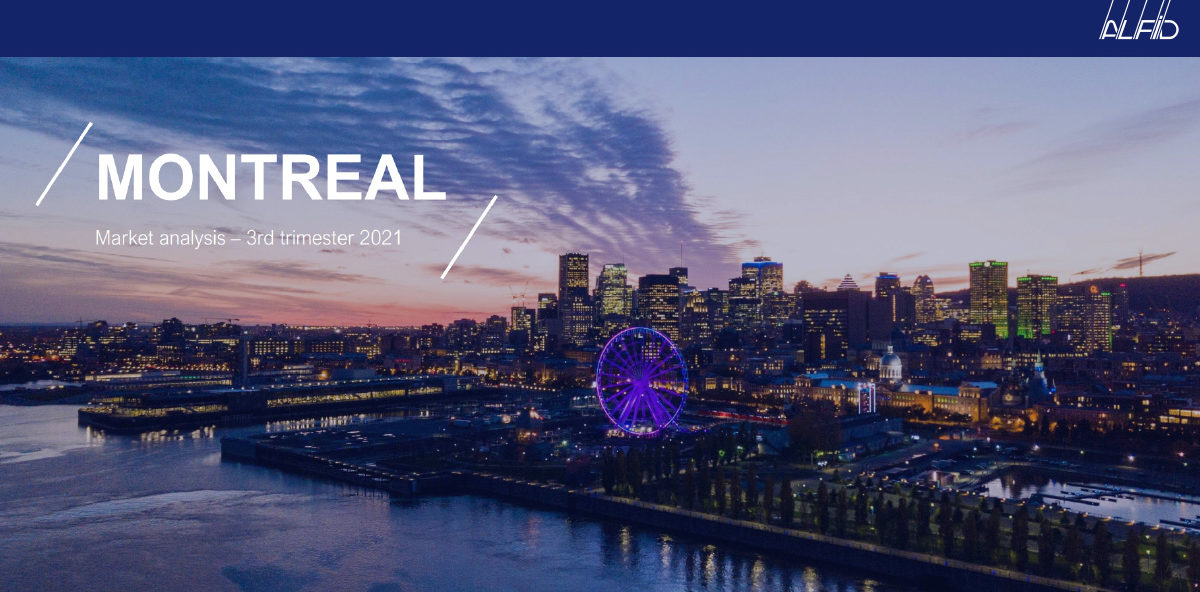Economic analysis of real estate markets: inflation under the radar
Across Canada, real estate markets have faced relentless challenges as the length of the pandemic has underscored market vulnerabilities and shifts in demand for high-yield investments, particularly in office and retail.
Each quarter, the Alfid Group, which specializes in real estate management, offers a detailed report, supported by macro and micro economic indicators to help you see clearly on the real estate markets.

Economic overview: inflation under the radar
Real gross domestic product (GDP) rose 1.3% in the third quarter, driven mainly by household spending and exports. As pandemic-related restrictions were lifted, households and businesses in Canada and around the world resumed normal activities, resulting in increased household spending and by growing export demand.
After rising 4.1% year over year in August, the Consumer Price Index (CPI) rose 4.4% in September, the highest rate since February 2003. Excluding gasoline, the CPI rose 3.5% year over year in September.
The Bank of Canada announced on September 8th that it would maintain the target for the overnight rate at its floor value of ¼%. The official discount rate remains at ½%, and the deposit rate at ¼%. The Bank continues to provide exceptional forward guidance on the path of the overnight rate. It continues the reinvestment phase, keeping its overall portfolio of Government of Canada bonds fairly stable.
The unemployment rate in the third quarter of 2021 was 5.9% in Quebec and thus approached pre-pandemic levels. It should be noted that during the two years preceding the health crisis, the rate in Quebec remained between 5.0% and 5.5%.
A return to downtown Montreal for commercial tenants
While the current fourth wave has amplified short-term volatility and slowed the economic recovery, occupants are less likely to leave their offices.
Due to strong demand for serviced offices, particularly in the hub markets of Toronto and Vancouver since this summer, sublease space is shrinking across the country. Representing only 20.5% of the vacant space, most of the quality premises that are offered for subletting are the subject of an offer.
Canadian tenants hoping for a significant drop in rent will likely be disappointed in 2021. Such price drops come late after shifts in the economy. Not to mention that price rebounds are quicker to be felt when the economic situation improves. This is currently happening in Asia, where the downward trend in office rents is losing steam.
There is a significant decrease in the number of people who are totally teleworking. This ratio slipped below 50% (47%) in the third quarter of 2021 for the first time since the spring of 2020. Conversely, the trend towards partial telework is up slightly.
In general, the return to the office is slow, which is also in line with the wishes of Public Health. Several large companies and state-owned companies have also announced that they have postponed the call to return to the office until early 2022.
Residential real estate: the acclaimed rental property
If the criteria for selecting apartments change little (balcony, good HVAC system and quality of finish), the rise in rents and the desire for autonomy change the behavior of tenants. More households in the Montreal CMA (22% in 2021 compared to 18% in 2020) mention the increase in housing prices to remain tenants. Also, when asked about their intentions to return to renting, 13% of future sellers answer “yes” while they were 18% to do so in 2020. This drop is mainly attributable to people aged 55 and over who are much less likely to consider renting after the sale of their home.
Outlook:
The Government of Quebec still recommends the continuation of teleworking, while the reopening campaign has been launched for a long time. This recommendation continues to affect office occupancy throughout Greater Montreal. Many office users are using this time to plan their return to work, and while this will lead to increased demand in the future, it will not offset the current trend in market fundamentals. We expect these tenant-friendly conditions to persist through 2022.
If you would like to receive the full report of our quarterly analysis, write to us: jchareyron@alfid.com
The company in brief: The Alfid Group supports its private and public partners with its personalized investment services and its 360 real estate management. The Alfid Group offers a wide range of management services for office buildings, multi-residential properties, commercial and industrial surfaces ranging from purchase to sale, including security and maintenance. The Alfid Group also brokers and advises its clients on the most appropriate investment formulas. With 390 employees, the Alfid Group is well equipped to deal with a wide variety of files in the field of management and real estate. Alfid now manages several thousand apartments in Montreal and its suburbs as well as nearly 4,000,000 square feet of office, commercial and industrial space.






